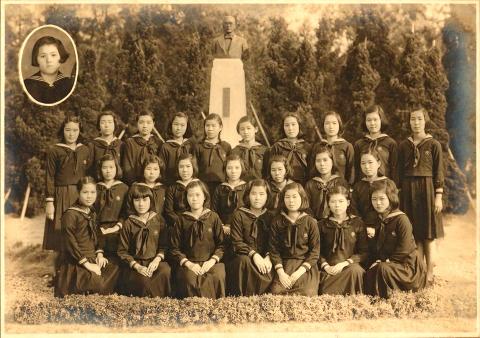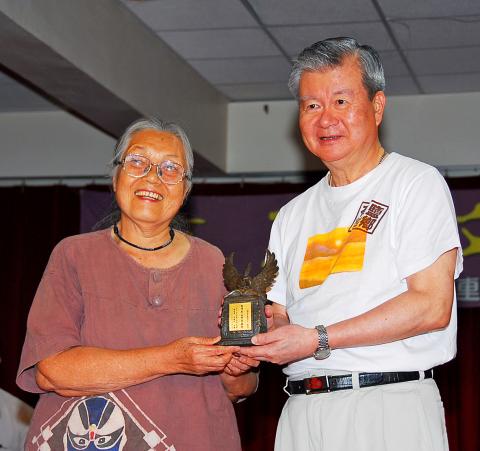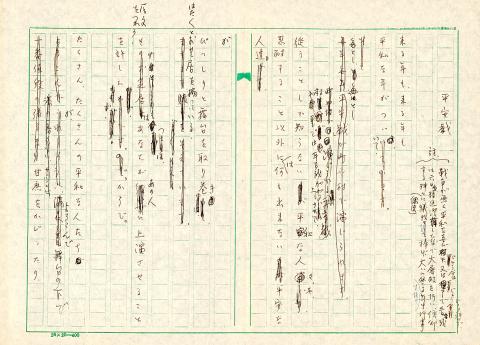March 6 to March 12
Last month, the family of the late poet Tu Pan Fang-ko (杜潘芳格) donated 340 manuscripts to the National Central Library. The three languages these documents were written in — Japanese, Mandarin and Hakka — represent Tu Pan’s literary journey through Taiwan’s turbulent history.
Living through the Japanese and Chinese Nationalist Party (KMT) regimes, the political climate dictated what language Tu Pan wrote in for most of her life. It wasn’t until she was in her 60s that she began to use her native Hakka.

Photo courtesy of National Central Library
Writers like Tu Pan are often included in the “translingual generation” (跨語言的一代), a term coined in 1967 by poet Lin Heng-tai (林亨泰) to describe those who were educated in Japanese but were forced to pick up Mandarin under KMT rule. He specifically referred to those who came of age under the colonial government’s Japanifcation policy, which officially began in 1936.
“When Japanese rule ended, we were in our 20s. Unlike the older generation who may have had some exposure to an education in Chinese, we were strictly educated in Japanese since childhood. While we were no longer forced to speak Japanese, it was the language we were most comfortable writing in. We had to be determined enough to make another shift, which was to learn Chinese,” he wrote.
A National Museum of Taiwan Literature publication states, “This was especially problematic for writers, as they lost their rich vocabulary, grammar and ability to express complex thoughts. Many stopped writing, and others had to study for years before they could write in Chinese.”

Photo: Chen Yi-min, Taipei Times
But like other members of this generation, being forced to use a new language did not dampen Tu Pan’s literary passion.
“If you ask me why I write, you might as well ask me why I live,” she said in a 2004 interview with Ink Literary Monthly (印刻文學生活誌). “My words have a life of their own … they simply appear, and I’m compelled to write them down.”
Born on March 9, 1927 to wealthy and educated parents, Tu Pan’s family moved to Japan when she was an infant. They returned when she was about six years old, and enrolled in Japanese schools up to the college level. Her work is shaped by many conflicts in her life — being bullied by Japanese schoolmates, questioning the role of women in society, defying her parents’ wishes by choosing her own husband and losing several family members in the 228 Incident.

Photo courtesy of National Central Library
The KMT banned writing in Japanese in 1946, and Tu Pan did not publish anything for more than a decade. She was also busy helping her husband and raising seven children during this time. In 1966, she published her first Mandarin poem, written in Japanese and translated by fellow writer Wu Cho-liu (吳濁流).
Most of her early works in Mandarin were translations of Japanese originals. Lee Yuan-chen (李元貞), a professor of Chinese literature, writes that they often suffered at the hands of various translators, who were often male and did not grasp the nuances of the female perspective.
“This is one of the reasons she wasn’t as influential as she could have been,” Lee writes. “Such is the fate of many members of the translingual generation.”
NATIVE TONGUE
After the lifting of martial law in 1987, Hakka intellectuals founded Hakka Affair Monthly magazine (客家風雲) and held a “Return My Native Language” (還我母語) march on Dec. 28, 1988.
Tu Pan was never fully comfortable writing in Mandarin, and Japanese remained the main language she used during the creative process. One day, however, she noticed that “some verses started to naturally form in my native Hakka.”
“I picked the words up and wove them into Hakka poems,” she continues. “But it was difficult, as I had a limited literary vocabulary.” Figuring out how to write down Hakka sayings that did not have Mandarin counterparts was also a challenge.
She published her first Hakka poem in 1989, and soon it became a mission to help keep the language alive.
“It is time for some soul-searching as we Hakka people are being assimilated by other groups,” she wrote in a 1994 column for The Commons Daily (民眾日報). “We should love our native language and find ways to improve it and turn it into an elegant and beautiful language … I hope that Hakka writing can develop and become a trend.”
She says she wanted to follow the example of Dante, who wrote The Divine Comedy in Italian instead of the prevalent Latin, adding that if the work becomes popular enough, the language it uses will increase in prestige.
In addition to new pieces, she also reworked some of her old poems in Hakka, which were often not straight translations. The original 1977 Mandarin version of Peace Play (平安戲), for example, doesn’t include a Hakka-specific euphemism that the 1995 Hakka version does.
Tu Pan then penned several poems stressing the importance of speaking one’s mother tongue. After it became acceptable to speak in languages besides Mandarin, she also became worried that Hakka was losing ground to Hoklo (commonly known as Taiwanese).
“Recently, everybody is speaking Taiwanese … But there are many types of Taiwanese. Aboriginal languages and Hakka are also Taiwanese,” she wrote in a 1993 piece.
And after writing for her entire life in Japanese and Mandarin, she denounced the two languages:
“[They] are two languages that we were forced to learn by authorities, and represent our enslavement. Mandarin and Japanese are merely a common means for us to communicate — it is not our native language. We Taiwanese have been culturally assaulted for 100 years; our language taken away by outsiders.”
Taiwan in Time, a column about Taiwan’s history that is published every Sunday, spotlights important or interesting events around the nation that have anniversaries this week.

Taiwan has next to no political engagement in Myanmar, either with the ruling military junta nor the dozens of armed groups who’ve in the last five years taken over around two-thirds of the nation’s territory in a sprawling, patchwork civil war. But early last month, the leader of one relatively minor Burmese revolutionary faction, General Nerdah Bomya, who is also an alleged war criminal, made a low key visit to Taipei, where he met with a member of President William Lai’s (賴清德) staff, a retired Taiwanese military official and several academics. “I feel like Taiwan is a good example of

March 2 to March 8 Gunfire rang out along the shore of the frontline island of Lieyu (烈嶼) on a foggy afternoon on March 7, 1987. By the time it was over, about 20 unarmed Vietnamese refugees — men, women, elderly and children — were dead. They were hastily buried, followed by decades of silence. Months later, opposition politicians and journalists tried to uncover what had happened, but conflicting accounts only deepened the confusion. One version suggested that government troops had mistakenly killed their own operatives attempting to return home from Vietnam. The military maintained that the

Jacques Poissant’s suffering stopped the day he asked his daughter if it would be “cowardly to ask to be helped to die.” The retired Canadian insurance adviser was 93, and “was wasting away” after a long battle with prostate cancer. “He no longer had any zest for life,” Josee Poissant said. Last year her mother made the same choice at 96 when she realized she would not be getting out of hospital. She died surrounded by her children and their partners listening to the music she loved. “She was at peace. She sang until she went to sleep.” Josee Poissant remembers it as a beautiful

Before the last section of the round-the-island railway was electrified, one old blue train still chugged back and forth between Pingtung County’s Fangliao (枋寮) and Taitung (台東) stations once a day. It was so slow, was so hot (it had no air conditioning) and covered such a short distance, that the low fare still failed to attract many riders. This relic of the past was finally retired when the South Link Line was fully electrified on Dec. 23, 2020. A wave of nostalgia surrounded the termination of the Ordinary Train service, as these train carriages had been in use for decades